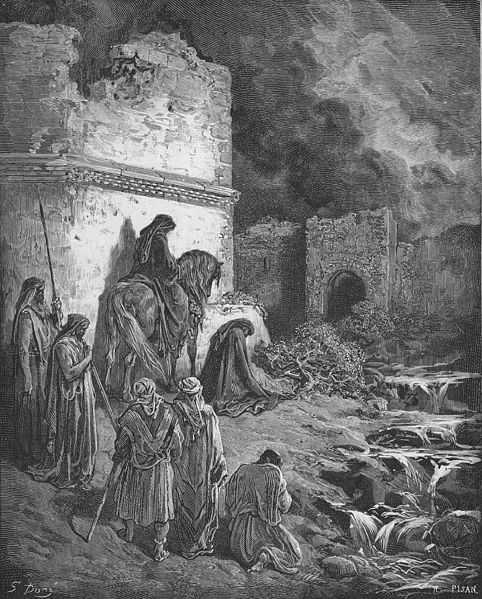
Gustav Dore, “Nehemiah Views the Ruins of Jerusalem’s Walls” (1866)
I started reading the Book of Nehemiah again the other day, and I got to thinking about walls.
Walls are unfashionable in our time. “Open plan” homes are trendy (or maybe that trend has passed. I’m not exactly up on architectural fashions). For years, businesses have believed – in the absence of any evidence whatever – that productivity and morale can be improved by putting employees in big bullpens instead of giving them offices (management, of course, gets to have offices). When people talk about “tearing down walls,” they generally mean walls of prejudice and misunderstanding. This trend of thought goes back a long way, at least to Robert Frost’s poem “Mending Wall”: “Something there is that doesn’t love a wall, That wants it down!”
I myself, on a far lower level, wrote a song with the same sort of theme back in my college/musical group days. And no, I won’t tell you the words. You’ll never hear it, and I’m fine with that.
There’s an assumption in a lot of Christianity, too, that walls are uniformly bad. All walls need to go. Joshua knocked down the walls of Jericho. Christ, as we are told in Ephesians 2:14, destroyed “the dividing wall of hostility.” So the reflexive assumption is that Christians are against all walls, at least in the moral and cultural sense.
But it’s not at all that simple in reality. If you actually read the Bible (and one of the problems I’ve faced increasingly, on the rare occasions when I can be lured into an argument, is that I’ve found myself arguing a book I’ve actually read with people who only know it by hearsay) you’ll see that walls in Scripture are just like any other temporal thing. They’re good in the right place, and bad in the wrong place. The whole Book of Nehemiah is about restoring a wall that’s been torn down. The wall itself is a symbol of the religious law that stands between the Jews and their pagan neighbors. This wall is a necessity if the nation is to survive; it has God’s blessing. In the parable of the vineyard in Matthew 21:33-41, Jesus tells of a man who plants a vineyard and builds a wall around it. This land owner represents God, and his wall is a perfectly reasonable barrier to keep unwanted pests, human and animal, out.
There’s a perception about in the world today that Christians have no sense of nuance. Everything is black and white for us. We can’t see shades of gray.
But that’s only true if you’re selective in your observations. In the matter of walls, for instance, Christians see them as either good or bad, depending on who builds them, where, and for what purpose.
Or, as G. K. Chesterton said in Why I Am a Catholic, “There exists in such a case a certain institution or law; let us say, for the sake of simplicity, a fence or gate erected across a road. The more modern type of reformer goes gaily up to it and says, “I don’t see the use of this; let us clear it away.” To which the more intelligent type of reformer will do well to answer: “If you don’t see the use of it, I certainly won’t let you clear it away. Go away and think. Then, when you can come back and tell me that you do see the use of it, I may allow you to destroy it.”

Joshua! Joshua did a lot of things that ought to be troubling to Christians.
Your later reflections are right, I think. Ezekiel 8-12 has a lot to say about the use of walls in a failed attempt to conceal sins from God. But Ezekiel is the end of old proverbs in many ways: “I shall make this proverb cease, so they will no longer use it as a proverb in Israel.”
There may come a time when we need no walls. But God knows what they are for.
G. K. Chesterton also said that a creed is at once the widest thing in the world, and the narrowest.
I’d like to add that Christianity broke the walls between Jew and Gentile, but did it by erecting a wall between Christian and non-Christian.